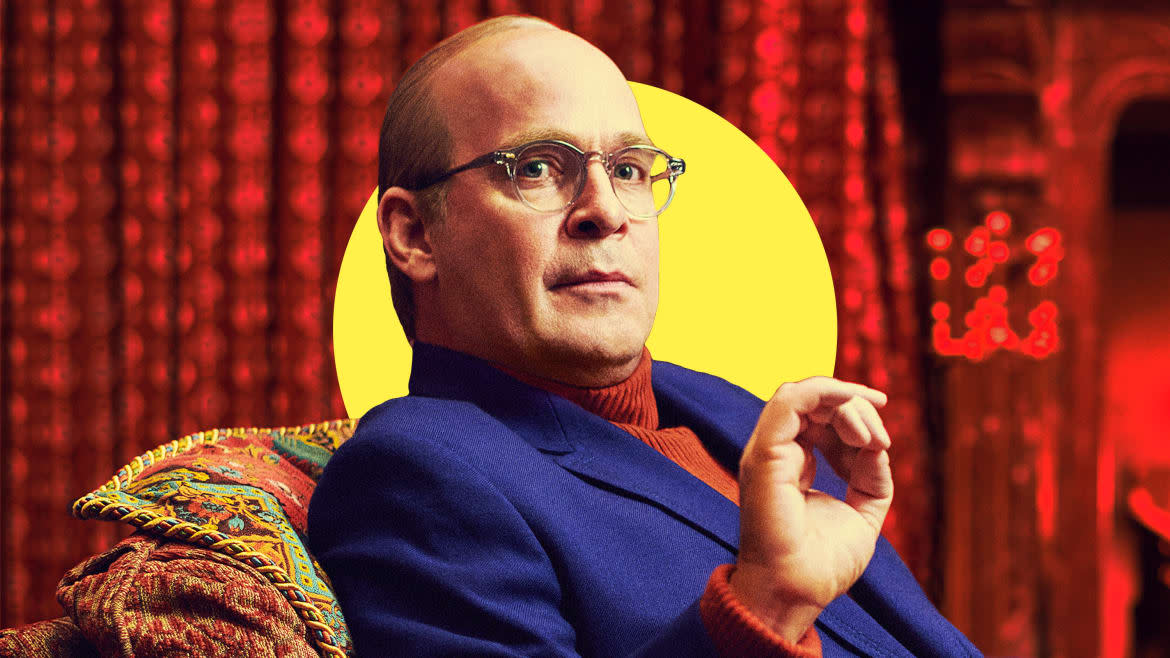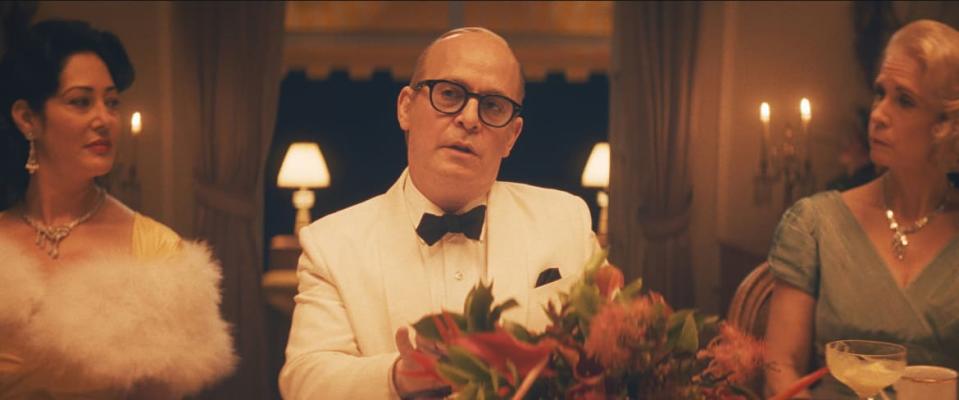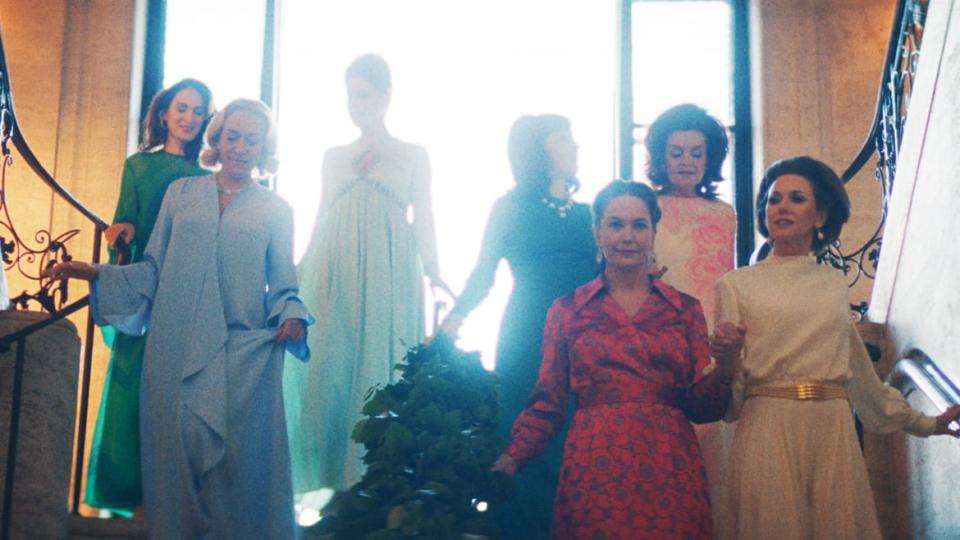‘Capote vs. the Swans’ Is a Gloriously Bitchy Real ‘Real Housewives’

It has taken seven years for a second season of Feud—one of Ryan Murphy’s litany of anthology series—to see the light of day. The first, Feud: Bette and Joan, aired practically a lifetime ago (at least in the world of television). It was a thrilling, gossipy little dish, but it arrived coasting on the fumes of viewers’ exhaustion with all things Ryan Murphy. The series had his signatures all over it; he created, co-wrote, and directed nearly every episode. But even with a crack team of Susan Sarandon and Jessica Lange in the lead roles, Bette and Joan often felt indistinguishable from its progenitor’s other, wildly camp affairs.
But Season 2, Feud: Capote vs. the Swans (airing Jan. 31 on FX and streaming on Hulu), is a different story. For this round, Murphy has handed the reins to director Gus Van Sant and writer Jon Robin Baitz, who have crafted a tale of venomous glamor and vacant adulation so intriguing that it demands deeper examination. Together, they probe the fallout from the release of a chapter in famed writer Truman Capote’s (Tom Hollander) final, unfinished novel, Answered Prayers. In the book, Capote exposed the secrets of the inner lives of his close circle of female friends—whom he deemed “the swans” for their ethereal beauty—and was cast out of his place in New York’s high society in return. But no one was cut more deeply than Babe Paley (Naomi Watts), Capote’s closest friend who confided to him every concealed truth.
This mutually ruinous relationship between the writer and his subjects is mined for every last bit of juicy scandal. While the entire eight-episode season is a nasty pleasure to watch, its poignant back half is particularly captivating. Baitz and Van Sant keenly construct a rich set of characters, all of whom deliver the vengeful goods as they move about the upper-crust circles of a bygone era of New York glitz. As that period fizzles out in a champagne-colored haze, Watts and Hollander deliver remarkable performances as two lost souls, set adrift without their other half. For all of its delightful bitchiness, Capote vs. The Swans tempers its spite to find deeply resonant humanity in its subjects for a series that’s as heartbreaking as it is haute.

Tom Hollander as Truman Capote.
FX has billed Capote vs. the Swans as a tale about “the original Housewives.” And as eye-roll-inducing as that tagline may be, it’s apt: Examining the similarities between Capote’s Swans and the Real Housewives doesn’t leave much room for debate. In this show, there are cheating scandals, nefarious backstabbing, faux niceties, and plenty of public spats—not too far off from what your dog sees if you leave Bravo on all day for noise to keep them company. But in the 1960s and ’70s, when Capote and his Swans were beginning to lose their influence and power, the consequences of these deceptions were much more colossal than those of most modern reality television arcs.
The premiere episode is one hour of non-stop catty cruelty that effectively sets the stakes for the remainder of the season. Fresh from the massive popularity of his novel In Cold Blood, Capote is riding the wave of adoration that comes with celebrity and new money. And for him, that means an increasing dependence on booze and pills. Tasked with concocting something just as gripping, Capote decides to lambaste the world of the Upper East Side elite after spending years ingratiating his distinctly southern, voluble, and gay self into the nobility of New York’s upper class. This means taking down all of his cohorts, one by one, in a proof-of-concept chapter printed in Esquire in 1975.
“La Côte Basque 1965” sharply pilloried Capote’s friends, either by their own names or thinly veiled pseudonyms. And if those in his circle of Swans managed to avoid the line of fire, they were still implicated within the chapter. Alongside Babe Paley, there was Slim Keith (Diane Lane), the hardened matron of high-class stature; Lee Radziwill (Calista Flockhart), Jackie Kennedy’s sister, toiling in her sibling’s shadow; C.Z. Guest (Chloë Sevigny), a multi-hyphenate socialite; Joanne Carson (Molly Ringwald), wife of talk show legend Johnny Carson; and Ann Woodward (Demi Moore), an aristocrat whose renown was tarnished by suspicions that she killed her husband. Each of these women suffered at the whims of Capote’s pen or by their proximity to his eventual demise.
Sorry Haters: Kim Kardashian Was Seriously Good in ‘American Horror Story’
One might think that balancing such a star-studded cast of performers would be a difficult task, or that their presences could become gimmicky. But Baitz’s writing innately understands how to keep this revolving door of scene-stealers from spinning out of control. Capote vs. the Swans is the kind of substantive series that gay men and those who love esteemed actresses dream about when they go to sleep. And though some parts are far smaller than others—I could have done with so much Moore (thank you)—even the minor characters have their moments in the sun. I won’t soon forget seeing Demi Moore clad in a bouffant and yelling slurs in Tom Hollander’s face, and it’s that very thing that people come to a Ryan Murphy production to see: delicious shock and awe.
But there is a whole world of truth beneath the shiny topsoil of pills, booze, and wretched glamor. Hollander’s Capote lives between these two states: the showman and the writer who only ever wanted love. It’s not just Hollander’s reproduction of Capote’s distinct voice and mannerisms that are spot-on; it’s also the frail sadness evident behind his eyes, the kind that was evident in the writer’s strung-out talk show appearances and between the lines of his books. He inhabits Capote in a way that captures all of the ugliness present in his later life (he died in 1984), but his physicality never crosses the line into a callous caricature. Even at his most harsh, Hollander’s Capote is warm and bewitching—the kind of friendliness that makes the author’s eventual duplicity so difficult to forgive.
Watching Watts as Babe Paley trying to navigate this betrayal is to watch an actor deliver career-best work in real time. Not since her collaborations with David Lynch has Watts been so perfectly cast. She is uniquely capable of illustrating Babe’s over-the-top material obsession as what it really was: the striving for serenity through infallible perfection. The show cleverly builds the golden gates inside of which Babe and her closest confidant, Capote, locked themselves, and Watts’ horror as everything her character once knew comes crumbling down is spellbinding. She doesn’t conjure the familiar feeling of watching a rich, apathetic socialite get her comeuppance; rather, she’s a woman being stripped of the one thing she thought to be real in a world where artifice is the currency of choice.

From left: Chloe Sevigny as C.Z. Guest, Naomi Watts as Babe Paley, and Diane Lane as Slim Keith.
Of course, those tuning in simply to see the ways that these actors can chew scenery will not be disappointed. The show is, after all, called “Feud,” a name that implies some level of triviality to the whole matter. Some scenes will enter the meme pantheon of great actresses hamming it up onscreen forevermore. (Flockhart and Lane are especially so damn good as the equally combative Slim Keith and Lee Radziwill.) But even the fiercest characters are far from one-note; their greater yearnings are always sitting just beneath their poisonous tongues.
Intricate details, gorgeous costuming, and enough bouffant wigs to fill a cargo hold round out Capote vs. the Swans as one of the finest, most technically faultless limited series to hit television in years. And even when things take a slight turn for the fantastical toward the season’s end, with a dream sequence or a booze-addled vision in Capote’s mind (which often boasts a major cameo from a certain distinguished Ryan Murphy favorite), the show never comes close to falling off the rails.
The centuries-old, symbiotic relationship between gay men and the women they love is explored with great intention, and there is meaning to each choice you see onscreen. Make no mistake: This is a story of privileged white people and what happens when they toy with their entitlement. But it’s also a love story and a tragedy, wrapped up by a bow with razor-sharp edges. Capote vs. the Swans is as exquisite as the era it captures, reminding us that we are never doomed, so long as we have someone to love.
Get the Daily Beast's biggest scoops and scandals delivered right to your inbox. Sign up now.
Stay informed and gain unlimited access to the Daily Beast's unmatched reporting. Subscribe now.


